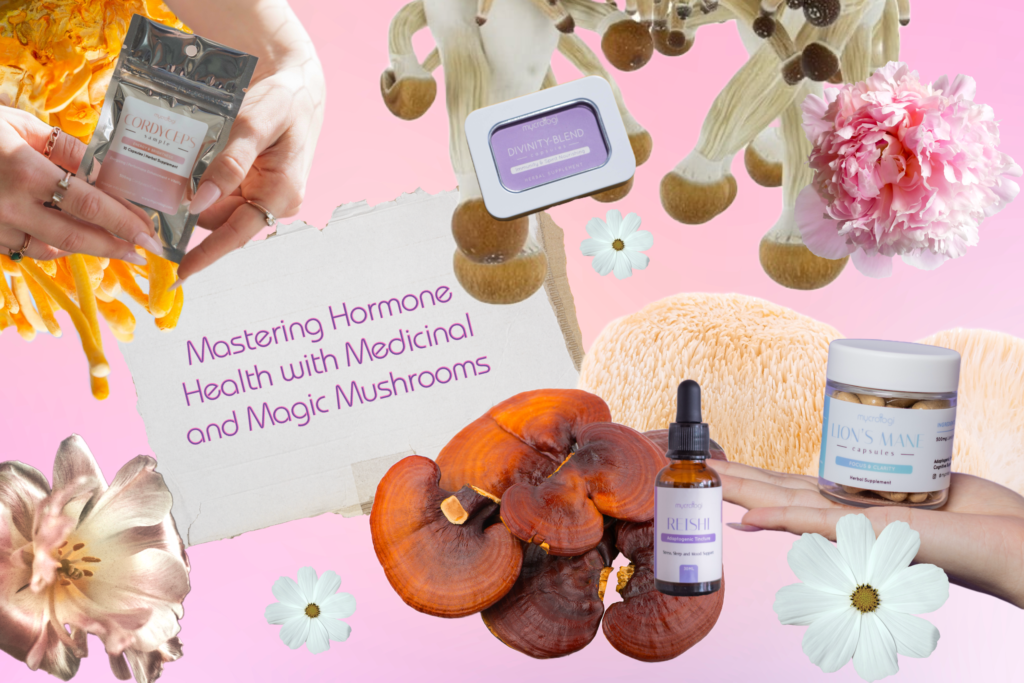Uncategorized
Mastering Hormone Health with Medicinal and Magic Mushrooms
It is 2024, and women are EMPOWERED to take control over their health. Playing a vital role in this holistic health movement? You guessed it, mushrooms. Playing an even bigger role in women’s health? That’s hormone health.
Hormone health plays a crucial role in daily functioning, affecting areas like blood pressure, sleep, sex drive, fertility, metabolism, and more.
When our hormones enter a state of imbalance, symptoms may include fatigue, depression, anxiety, digestive issues, acne, and loss of libido.
With 80% of female reproductive systems facing some degree of hormone imbalance, there may be room for speculation that the upsurge in mental health disorders and the vast number of those suffering from hormone imbalances may go hand in hand.
So how do we bring these important hormones back to a state of balance? While things like managing our stress, eating better, and medication can help us achieve this, many others are turning to earth-derived substances like mushrooms to get both their hormones and mental health back in check.
And it’s working.
Medicinal Mushrooms for Hormone Health
Medicinal mushrooms are taking up more and more space in women’s medicine cabinets, and for good reason.
Mushrooms like Reishi, Cordyceps, and Lion’s Mane are all gaining popularity for their seemingly endless array of health benefits — hormone health included.
1. Reishi for Hormone Health
Reishi (Ganoderma lingzhi) has been used in traditional Chinese medicine for centuries, with an emphasis on boosting the immune system and enhancing general health and well-being.
Reishi mushrooms have been shown to reduce stress and help regulate cortisol levels, indirectly contributing to stability in the endocrine system.
Taking Reishi on a regular basis, especially during the PMS stages of a menstrual cycle, can assist in hormone balance by supporting the adrenal glands and keeping chronic stress at bay. It’ll help you sleep better too!
You can try our Reishi Tincture here!
1. Cordyceps for Hormone Health
Cordyceps is an incredible crash-free energy source, helping our body adapt to stress and allowing us to thrive during the phases of our hormone cycle where energy depletes.
Similar to Reishi in its ability to stabilize the endocrine system through its stress-reducing properties, Cordyceps is a beloved supplement for its energy-boosting qualities and its ability to support adrenal function and combat fatigue, commonly associated with hormone imbalance.
Studies suggest that bioactive compounds found in Cordyceps may produce estrogen-like effects in the body, potentially contributing to a more balanced hormonal environment.
You can try our energy-boosting Cordyceps capsules here!
3. Lion’s Mane for Hormone Health
Lion’s Mane (Hericium erinaceus) is a beloved adaptogen, most commonly used for its cognitive enhancement and brain-boosting effects.
Lion’s Mane stimulates the production of nerve growth factor (NGF) in the brain, which indirectly impacts the hypothalamus – a small, yet crucial area in the brain that controls hormone release, among other various functions.
In doing so, Lion’s Mane may positively influence hormone regulation, contributing to mood improvement and overall well-being.
You can try our cognitive-enhancing Lion’s Mane capsules here!
While countless women are using medicinal mushrooms as a way to master their hormone health and live out an overall thriving lifestyle, more and more individuals are using magic mushrooms as a way to explore alternative methods of managing different hormone-related health conditions.
Psilocybin on Hormone Health: The 5-HT2A Receptor Effect
Psilocybin has many strengths, including its ability to promote neuroplasticity and help treat mental health disorders, working by activating the brain’s 5-HT2A serotonin receptors. Serotonin, commonly referred to as ‘the feel-good hormone,’ plays an important role in mood regulation and producing the happy feelings we experience when something good happens.
Excitingly, serotonin triggering through the 5-HT2A receptor may also play a role in the regulation of reproductive hormones, bringing a whole new realm of hope to those looking for new ways to reinstate hormone harmony in the body.
The 5-HT2A receptor is widely distributed across brain regions, including our endocrine glands, where activation of this receptor can influence hormone secretion. Simply put, hormone release triggered by 5-HT2A activation can positively affect crucial areas of our daily functioning that hormone imbalance can negatively impact, including how we manage stress, how fast we burn energy, and even our ability to reproduce.
In many women who suffer from PMS, serotonin levels drop as estrogen levels drop. Boosting serotonin levels during this phase is crucial for maintaining mood levels and cognitive functioning, especially in the luteal phase when PMS is common.
So, knowing that psilocybin has a knack for triggering this feel-good neurotransmitter, is it fair to say that a practice like microdosing or the occasional trip experience can influence our PMS symptoms positively? When we consider the interaction between psilocybin’s primary binding site (the 5-HT2A receptor) and a female’s hormonal interaction with that same hormone, the discussion is about as logical as it is intriguing. However, research in this area remains scarce.
Preliminary findings suggest a potential link between psilocybin and female hormone health; however, more comprehensive studies are needed to solidify these claims. What we do know, however, is that a number of factors contributing to hormone imbalance in women, such as stress and anxiety, may be supported, if not combatted entirely, by Mother Earth’s own psilocybin.
Psilocybin to Prevent Stress-Induced Hormonal Imbalance
When we take a look at some of the major causes of hormone imbalance, stress takes a top spot. Luckily, psilocybin is showing promise in attacking this issue.
Psilocybin on Stress Management:
Stress prompts the release of cortisol and adrenaline, part of the body’s ‘fight or flight’ response to immediate threats. While this response is crucial for coping with challenges, chronic or excessive stress can lead to prolonged release of these hormones, disrupting the hormonal harmony needed for women to feel their best.
Psilocybin has been shown to aid in stress management by reducing hyperactivity in the amygdala, a brain region responsible for processing fear and stress responses. It has also been shown to slow activity in the Default Mode Network, where stress may heighten indirectly through feelings of rumination, negative self perception, dysfunctions in emotional processing.
By slowing hyperactivity in areas like the amygdala and Default Mode Network, psilocybin may dampen our initial stress response and emotional reactivity that causes spikes in stress hormones like cortisol and adrenaline that throw our hormones off balance.
Another potential benefit of psilocybin is its ability to improve mood and reduce symptoms of depression, which may have a positive effect on stress levels as well. Psilocybin has been shown to increase the production of brain-derived neurotrophic factor (BDNF), a protein that plays a key role in the growth and maintenance of neurons in the brain. This increase in BDNF production may help alleviate symptoms of depression and chronic stress, while generating an overall more positive mood and outlook.
While more research is needed to solidify psilocybin’s direct impact on hormone health, it’s plausible that psilocybin could indirectly contribute to hormonal balance and overall well-being in women by reducing chronic stress, something that we know to be especially prominent in the luteal phase of a woman’s menstrual cycle.



